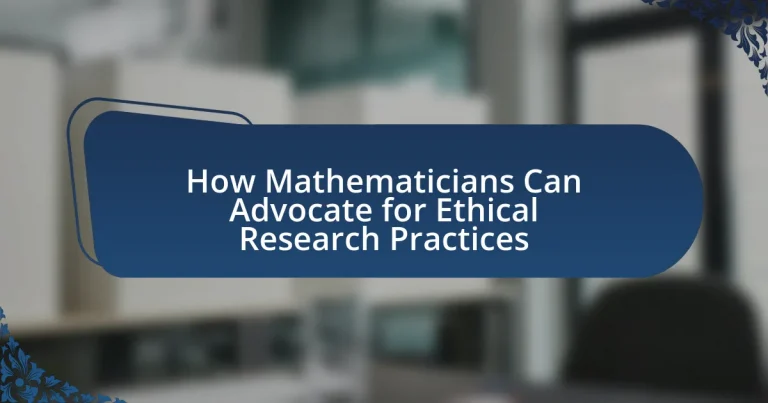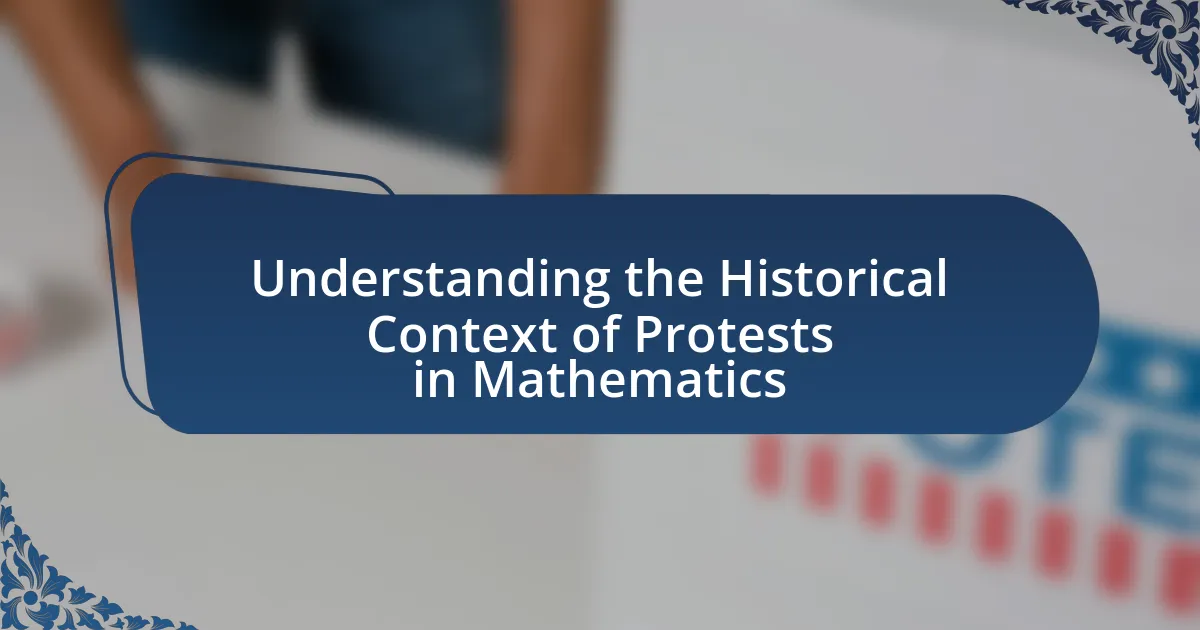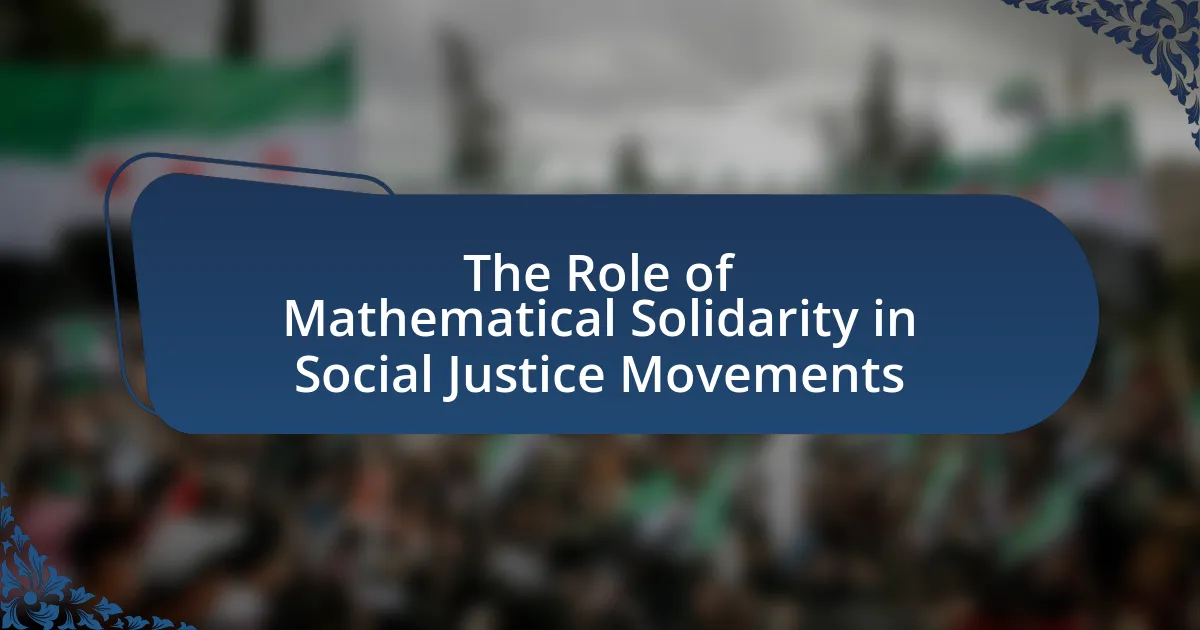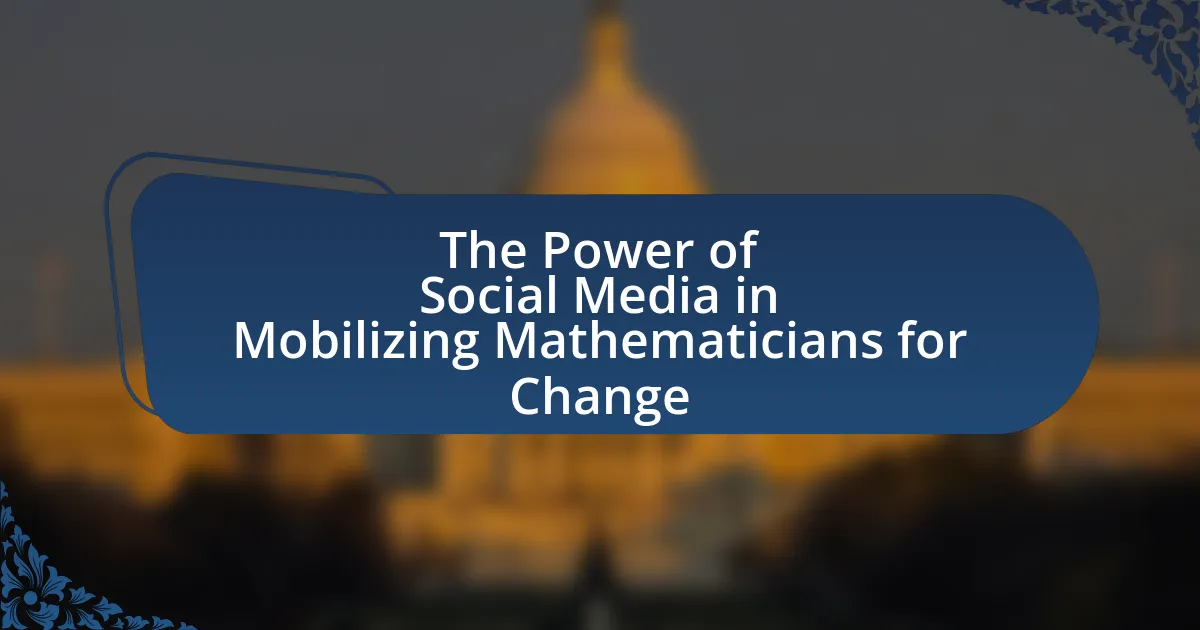The article focuses on how mathematicians can advocate for ethical research practices, emphasizing the importance of integrity, transparency, and accountability in the research process. It outlines key ethical principles, such as proper data representation, avoiding plagiarism, and engaging in peer review, which are essential for maintaining credibility in mathematical research. The article also discusses the potential consequences of unethical practices, common ethical dilemmas faced by mathematicians, and strategies for promoting ethics within the mathematical community, including education and mentorship programs. Additionally, it highlights the role of professional organizations in establishing ethical standards and providing resources to support mathematicians in navigating ethical challenges.
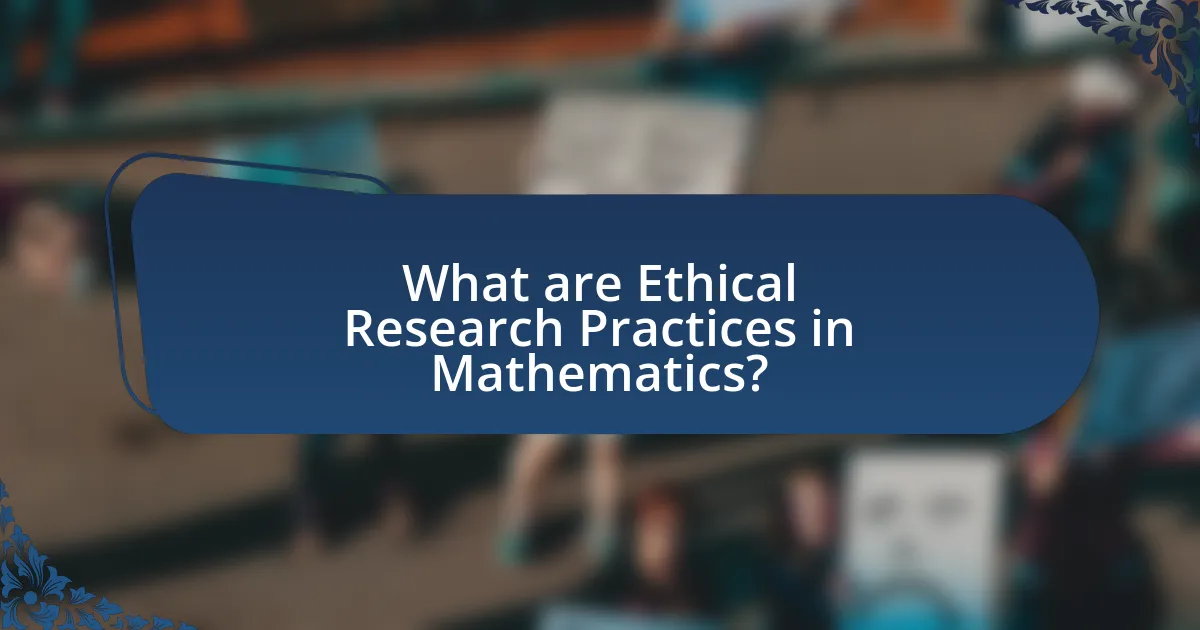
What are Ethical Research Practices in Mathematics?
Ethical research practices in mathematics involve maintaining integrity, transparency, and accountability throughout the research process. These practices include ensuring accurate representation of data, avoiding plagiarism, and obtaining proper consent when involving human subjects. For instance, mathematicians must provide clear citations for all sources and contributions, as demonstrated by the American Mathematical Society’s guidelines on ethical conduct, which emphasize the importance of honesty in research findings. Additionally, ethical practices require mathematicians to engage in peer review processes to validate their work, thereby fostering a culture of trust and collaboration within the mathematical community.
Why are Ethical Research Practices Important for Mathematicians?
Ethical research practices are crucial for mathematicians because they ensure the integrity and credibility of mathematical findings. When mathematicians adhere to ethical standards, they promote trust in their work, which is essential for collaboration and the advancement of knowledge. For instance, the American Mathematical Society emphasizes that ethical practices prevent misconduct such as plagiarism and data fabrication, which can undermine the entire field. Furthermore, ethical research fosters a culture of accountability and transparency, allowing for reproducibility and validation of results, which are foundational principles in mathematics.
What are the potential consequences of unethical research in mathematics?
Unethical research in mathematics can lead to significant consequences, including the erosion of public trust in mathematical findings and the potential for harmful applications of flawed research. When mathematicians engage in unethical practices, such as data fabrication or plagiarism, it undermines the integrity of the discipline, resulting in a loss of credibility among peers and the general public. Historical instances, such as the case of the fraudulent research by Jan Hendrik Schön in physics, illustrate how unethical practices can lead to widespread misinformation and misallocation of resources. Furthermore, unethical research can hinder scientific progress by diverting attention and funding away from legitimate studies, ultimately impacting advancements in technology and society.
How do ethical practices enhance the credibility of mathematical research?
Ethical practices enhance the credibility of mathematical research by ensuring integrity, transparency, and accountability in the research process. When mathematicians adhere to ethical standards, they minimize the risk of misconduct, such as data fabrication or plagiarism, which can undermine trust in their findings. For instance, a study published in the journal “Science and Engineering Ethics” highlights that adherence to ethical guidelines leads to more reliable and reproducible results, thereby fostering confidence among peers and the public. This trust is crucial for the advancement of knowledge and the application of mathematical research in real-world scenarios.
What Principles Underlie Ethical Research in Mathematics?
The principles that underlie ethical research in mathematics include integrity, transparency, accountability, and respect for intellectual property. Integrity ensures that mathematicians conduct their work honestly, avoiding fabrication or falsification of data. Transparency involves openly sharing methodologies and results, allowing for reproducibility and verification by peers. Accountability requires researchers to take responsibility for their work and its implications, ensuring that findings are used ethically. Respect for intellectual property acknowledges the contributions of others, promoting proper citation and collaboration. These principles are essential for maintaining trust and credibility within the mathematical community and ensuring that research benefits society.
How do integrity and honesty manifest in mathematical research?
Integrity and honesty in mathematical research manifest through rigorous adherence to ethical standards, transparent reporting of results, and proper attribution of ideas. Mathematicians demonstrate integrity by ensuring that their methodologies are reproducible and that their findings are presented without manipulation or misrepresentation. For instance, the American Mathematical Society emphasizes the importance of ethical conduct in research, highlighting that proper citation practices and acknowledgment of collaborators are essential for maintaining trust within the academic community. Furthermore, the commitment to peer review processes serves as a safeguard against dishonesty, ensuring that research is critically evaluated before publication.
What role does transparency play in ethical research practices?
Transparency is crucial in ethical research practices as it fosters trust, accountability, and integrity among researchers and stakeholders. By openly sharing methodologies, data, and findings, researchers enable peer review and replication, which are fundamental to scientific progress. For instance, the American Psychological Association emphasizes that transparency in research enhances the credibility of results and allows for the identification of potential biases or errors. Furthermore, studies have shown that transparent practices lead to increased collaboration and innovation within the research community, ultimately benefiting society as a whole.
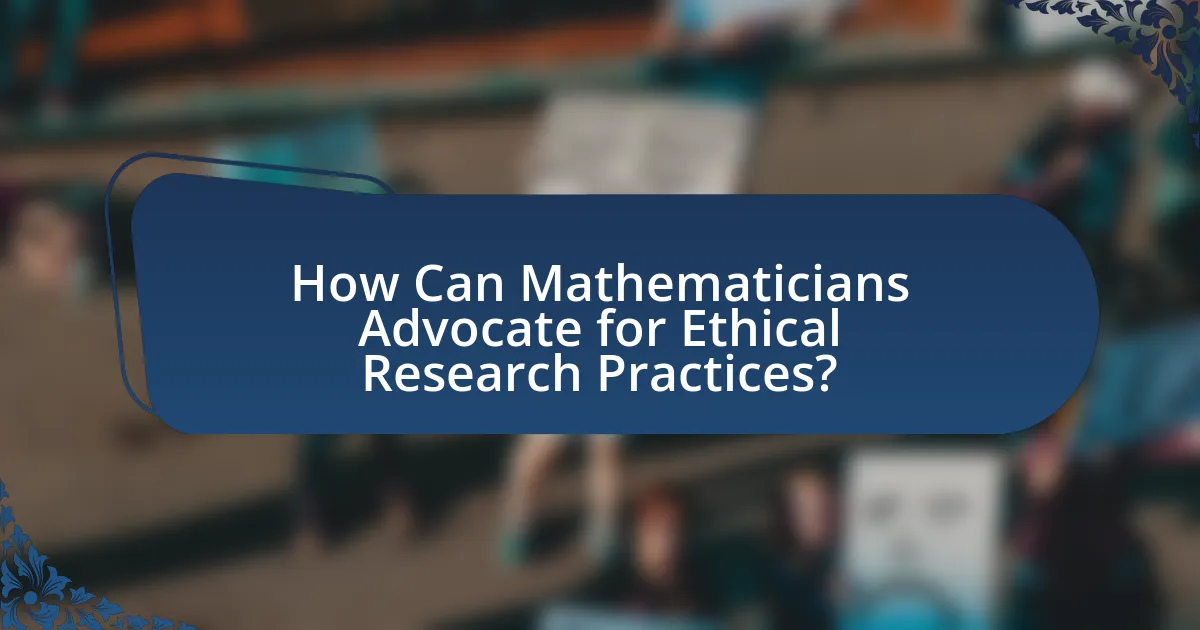
How Can Mathematicians Advocate for Ethical Research Practices?
Mathematicians can advocate for ethical research practices by promoting transparency, integrity, and accountability in their work. They can establish clear guidelines for ethical conduct, such as adhering to rigorous peer review processes and ensuring reproducibility of results. For instance, the American Mathematical Society emphasizes the importance of ethical standards in research, highlighting that mathematicians should disclose conflicts of interest and avoid plagiarism. By actively participating in discussions about ethical issues and collaborating with interdisciplinary teams, mathematicians can influence policies that foster a culture of ethical research within academia and industry.
What Strategies Can Mathematicians Use to Promote Ethics?
Mathematicians can promote ethics by integrating ethical considerations into their research practices and educational curricula. This can be achieved through the development of guidelines that emphasize integrity, transparency, and accountability in mathematical research. For instance, the American Mathematical Society has established ethical guidelines that encourage mathematicians to report unethical behavior and to engage in peer review processes that uphold ethical standards. Additionally, mathematicians can conduct workshops and seminars focused on ethical dilemmas in mathematics, fostering a culture of ethical awareness and discussion within academic and professional communities. These strategies not only enhance the ethical landscape of mathematics but also ensure that the discipline contributes positively to society.
How can mathematicians engage in discussions about ethics in their communities?
Mathematicians can engage in discussions about ethics in their communities by organizing workshops and seminars that focus on ethical implications of mathematical research and applications. These events can facilitate dialogue among mathematicians, educators, and community members, fostering a shared understanding of ethical considerations in areas such as data privacy, algorithmic bias, and equitable access to mathematical resources. For instance, the American Mathematical Society has hosted sessions on ethics in mathematics, highlighting the importance of these discussions in shaping responsible research practices.
What role do professional organizations play in advocating for ethical practices?
Professional organizations play a crucial role in advocating for ethical practices by establishing standards, providing resources, and fostering a culture of integrity within their fields. These organizations often develop codes of ethics that outline acceptable behaviors and practices, guiding professionals in their decision-making processes. For instance, the American Mathematical Society (AMS) promotes ethical research through its guidelines and resources, ensuring that mathematicians adhere to high standards of conduct. Additionally, professional organizations offer training, workshops, and forums that facilitate discussions on ethical dilemmas, helping members navigate complex situations. By actively engaging in policy advocacy and public awareness campaigns, these organizations also influence legislation and institutional policies that promote ethical practices in research and professional conduct.
How Can Education Foster Ethical Research Practices Among Mathematicians?
Education can foster ethical research practices among mathematicians by integrating ethics into the curriculum and emphasizing the importance of integrity in research. By incorporating case studies that highlight ethical dilemmas and the consequences of unethical behavior, educational programs can prepare mathematicians to navigate complex moral situations. Research indicates that programs emphasizing ethics lead to a greater understanding of responsible conduct; for instance, a study published in the Journal of Academic Ethics found that ethics training significantly improved students’ ability to identify ethical issues in research scenarios. This structured approach ensures that future mathematicians are equipped with the knowledge and skills necessary to uphold ethical standards in their work.
What topics should be included in mathematics curricula to emphasize ethics?
Mathematics curricula should include topics such as the ethical implications of data analysis, the role of statistics in decision-making, and the impact of mathematical modeling on society. These topics emphasize the responsibility mathematicians have in ensuring their work is used ethically and transparently. For instance, discussions on data privacy highlight the importance of ethical considerations when handling sensitive information, while exploring the consequences of mathematical models in areas like climate change or public health illustrates the societal impact of mathematical decisions. Integrating these topics into the curriculum fosters a comprehensive understanding of ethics in mathematics, preparing students to navigate the moral complexities of their future work.
How can mentorship programs support ethical research practices?
Mentorship programs can support ethical research practices by providing guidance and fostering a culture of integrity among researchers. Experienced mentors can instill ethical standards, ensuring that mentees understand the importance of honesty, transparency, and accountability in their work. Research indicates that mentorship positively influences ethical decision-making; for instance, a study published in the Journal of Research Ethics found that mentorship significantly enhances the ethical awareness of junior researchers. By modeling ethical behavior and discussing real-world dilemmas, mentors help mentees navigate complex situations, reinforcing the value of ethical practices in research.

What Challenges Do Mathematicians Face in Upholding Ethical Research Practices?
Mathematicians face several challenges in upholding ethical research practices, including issues related to data integrity, collaboration pressures, and the complexity of ethical guidelines. Data integrity is crucial, as mathematicians must ensure that their findings are based on accurate and reproducible results; however, the temptation to manipulate data for favorable outcomes can compromise this integrity. Collaboration pressures arise when mathematicians work in teams, where differing ethical standards or competitive motivations may lead to unethical practices, such as authorship disputes or inadequate credit for contributions. Additionally, the complexity of ethical guidelines can create confusion, as mathematicians may struggle to navigate the nuances of ethical research conduct, particularly in interdisciplinary projects where standards may vary. These challenges highlight the need for clear ethical frameworks and ongoing education in ethical practices within the mathematical community.
What are Common Ethical Dilemmas Encountered in Mathematical Research?
Common ethical dilemmas encountered in mathematical research include issues of data integrity, plagiarism, and the misuse of mathematical models. Data integrity is compromised when researchers manipulate or fabricate data to achieve desired outcomes, which undermines the validity of research findings. Plagiarism occurs when researchers fail to properly attribute the work of others, violating academic honesty principles. The misuse of mathematical models can lead to misleading conclusions, especially when models are applied outside their intended context or without proper validation. These dilemmas highlight the importance of ethical standards in maintaining the credibility and reliability of mathematical research.
How can conflicts of interest affect research outcomes?
Conflicts of interest can significantly skew research outcomes by introducing bias that affects the integrity of the findings. When researchers have financial, personal, or professional stakes in the results, their objectivity may be compromised, leading to selective reporting or manipulation of data. For instance, a study published in the Journal of the American Medical Association found that research funded by pharmaceutical companies was more likely to report favorable outcomes for the drugs being tested, highlighting how financial interests can distort scientific evidence. This undermines public trust in research and can lead to harmful consequences in policy and practice.
What are the implications of data manipulation in mathematical studies?
Data manipulation in mathematical studies can lead to significant ethical and scientific implications, including the distortion of research findings and the erosion of public trust in scientific results. When data is manipulated, it can produce misleading conclusions that affect subsequent research, policy decisions, and funding allocations. For instance, a study published in the journal “Nature” highlighted that manipulated data can lead to false claims about the efficacy of treatments, which can have dire consequences in fields like medicine. Furthermore, the integrity of the mathematical community is compromised, as reliance on flawed data undermines the foundational principles of accuracy and honesty in research. This manipulation not only affects the credibility of individual researchers but also damages the reputation of the entire discipline, making it crucial for mathematicians to advocate for ethical research practices to maintain the integrity of their work.
How Can Mathematicians Overcome Barriers to Ethical Research?
Mathematicians can overcome barriers to ethical research by implementing rigorous ethical guidelines and fostering a culture of transparency. Establishing clear ethical standards, such as those outlined by the American Mathematical Society, helps ensure that research practices align with ethical norms. Additionally, promoting open communication among researchers encourages the reporting of unethical practices and supports collaborative problem-solving. Research indicates that institutions with strong ethics training programs see a reduction in misconduct, highlighting the effectiveness of proactive measures in cultivating ethical research environments.
What resources are available for mathematicians facing ethical challenges?
Mathematicians facing ethical challenges can access several resources, including professional organizations, ethical guidelines, and peer support networks. Organizations such as the American Mathematical Society and the Society for Industrial and Applied Mathematics provide ethical guidelines and resources for addressing ethical dilemmas. Additionally, many universities have ethics committees and ombudspersons who can offer guidance. Peer support networks, including online forums and discussion groups, allow mathematicians to share experiences and seek advice from colleagues. These resources collectively help mathematicians navigate ethical challenges effectively.
How can collaboration among mathematicians enhance ethical standards?
Collaboration among mathematicians can enhance ethical standards by fostering a culture of accountability and shared responsibility. When mathematicians work together, they can collectively scrutinize methodologies, ensuring that ethical considerations are integrated into research practices. For instance, collaborative projects often involve peer review processes that highlight potential ethical issues, such as data manipulation or misrepresentation. Research has shown that collaborative environments lead to higher standards of integrity, as seen in studies like “The Role of Collaboration in Research Integrity” published in the Journal of Research Ethics, which indicates that teams are more likely to adhere to ethical guidelines than individuals working in isolation. This collective oversight not only promotes transparency but also encourages mathematicians to uphold ethical standards, ultimately benefiting the broader scientific community.
What Practical Steps Can Mathematicians Take to Ensure Ethical Research?
Mathematicians can ensure ethical research by adhering to established ethical guidelines, engaging in transparent collaboration, and promoting reproducibility in their work. Following ethical guidelines, such as those set by the American Mathematical Society, helps mathematicians navigate issues like data integrity and authorship. Transparent collaboration fosters an environment where researchers openly share methodologies and results, reducing the risk of misconduct. Additionally, promoting reproducibility, as emphasized in the 2016 “Reproducibility Crisis” report by the National Academies of Sciences, Engineering, and Medicine, ensures that findings can be independently verified, thereby enhancing trust in mathematical research.
How can mathematicians develop a personal code of ethics for their research?
Mathematicians can develop a personal code of ethics for their research by reflecting on their values, understanding the implications of their work, and adhering to established ethical guidelines within the mathematical community. This process involves identifying core principles such as integrity, transparency, and respect for intellectual property, which are essential for responsible research conduct.
Additionally, mathematicians can engage with professional organizations, such as the American Mathematical Society, which provide resources and frameworks for ethical standards. By reviewing case studies of ethical dilemmas in mathematics, they can better understand the consequences of unethical behavior and the importance of ethical decision-making. This approach not only fosters personal accountability but also contributes to the broader integrity of the mathematical field.
What best practices should mathematicians follow to maintain ethical integrity?
Mathematicians should adhere to transparency, honesty, and accountability to maintain ethical integrity. Transparency involves openly sharing methodologies, data, and findings, which fosters trust and reproducibility in research. Honesty requires mathematicians to accurately represent their work, avoiding misrepresentation of results or plagiarism, as evidenced by the ethical guidelines set forth by organizations like the American Mathematical Society. Accountability means taking responsibility for one’s work and its implications, ensuring that research is conducted and reported in a manner that upholds the highest ethical standards. These practices collectively contribute to a culture of integrity within the mathematical community.
